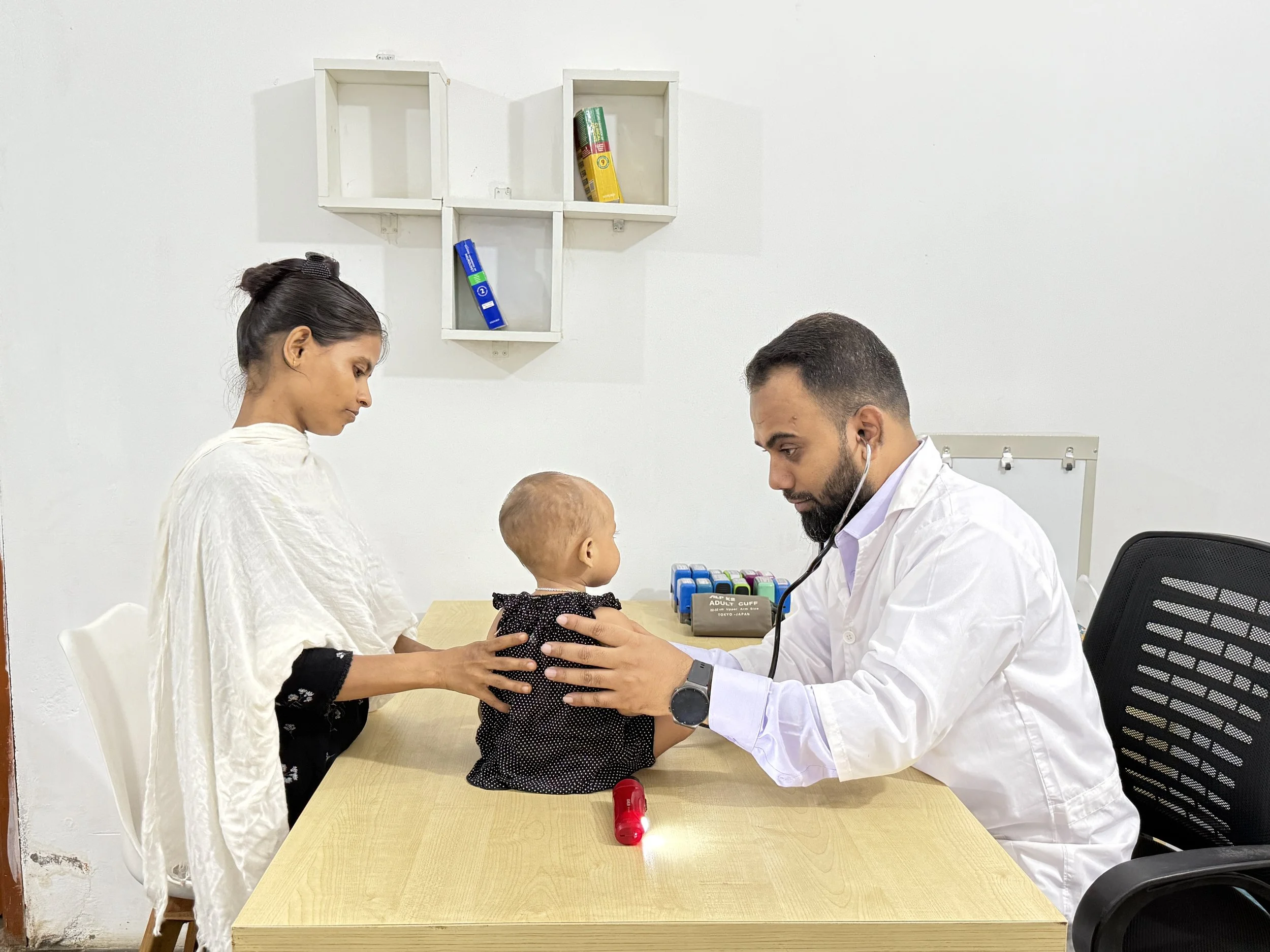Rewriting the Rules of Primary Care: How Spreeha Is Using AI to Serve the Underserved
Author: Dr. Ishtique Zahid, Senior Technical Advisor, Spreeha Foundation
Spreeha Urgent Care team managing patients with digital tools ©Spreeha Foundation
In a country where the average patient gets just 48 seconds with a doctor, and where 74% of healthcare costs are paid out-of-pocket, the stakes for access, quality, and equity in healthcare couldn’t be higher. Bangladesh, home to over 170 million people, faces a significant shortage of medical professionals, with just 7 doctors per 10,000 citizens far below the WHO's recommendation. This imbalance places immense pressure on tertiary hospitals and pushes patients toward unregulated health markets such as local pharmacy shops, unqualified practitioners, and fake doctors. As a result, many face misdiagnoses, counterfeit medications, and delayed treatment.
At the same time, Bangladesh’s healthcare industry is booming. With a market value of $14 billion in 2025, projected to reach $23 billion by 2030, and a growing middle class of over 34 million people, investment and innovation are pouring in. But the question remains: can this growth be made inclusive?
Spreeha believes it can. As a health innovation nonprofit, Spreeha is not just treating illness; it is transforming access. Through its network of tech-enabled, hyper-local urgent care centers, Spreeha is creating a blueprint for how AI and human-centered design can bring quality healthcare to underserved communities.
Dr. Ishtique Zahid examining a child at a health camp ©Spreeha Foundation
Rebuilding Primary Care, One Community at a Time
Since 2013, Spreeha has provided over 400,000 people with access to primary care through its healthcare centers located within underserved urban areas. In 2024 alone, six tech-enabled urgent care centers were established in Dhaka and Gazipur, each designed to serve 20,000 patients annually. These centers are intentionally located within a 1-kilometer radius of densely populated neighborhoods, ensuring that most people can reach them within 10 to 15 minutes on foot.
Spreeha's centers are led by trained paramedics, nurses, and medical assistants, who provide urgent care and support doctors for primary care. Patients receive diagnosis, treatment for minor injuries, nebulization, dressing, safe medications, and maternal-child health services, including access to gynecologists and pediatricians. Severe cases are referred to tertiary hospitals depending on the specific medical need, such as orthopedics, neurology, surgery, nephrology, and other relevant departments.
By partnering with AmarLab, a leading diagnostic logistics partner, Spreeha ensures that lab samples are collected professionally, transported under temperature control, and tested in certified facilities. Patients receive accurate reports without traveling long distances, significantly reducing both cost and effort.
Mother and child at Spreeha Urgent Care, Mirpur ©Spreeha Foundation
AI as a Catalyst for Smarter, Fairer Healthcare
At Spreeha, technology isn’t just a tool, it is embedded in the strategy to deliver smarter, more equitable healthcare. Artificial intelligence supports this vision at every level, from enhancing patient experiences to optimizing clinical decisions and streamlining operations.
For patients, AI-driven chatbots provide on-demand health guidance by assessing symptoms, explaining test results, and offering next-step recommendations. The system delivers clear, jargon-free interpretations of medical reports and flags any abnormal findings that require urgent attention. Patients also receive tailored health advice, including diet and lifestyle changes based on their health history. Automated systems send reminders for follow-ups, medications, and preventive screenings nudging people toward proactive care.
For doctors, AI works as a clinical assistant. From identifying drug interactions to recommending diagnostic tests, it supports physicians in making safer, evidence-based decisions. Doctors can also use pre-built treatment templates for common conditions, and high-risk patients are automatically flagged based on data analysis. This ensures better monitoring and timely interventions.
At the systems level, Spreeha is building AI capabilities that enhance operational efficiency across its healthcare network. From appointment scheduling to inventory management and medicine redistribution, AI helps reduce waste and improve patient experience. Disease trend analytics allow Spreeha to identify seasonal illnesses, plan resources, and launch targeted awareness campaigns.
Bringing Equity into the AI Equation
As Bangladesh’s digital health sector continues to grow rapidly, with a projected value of over $820 million in 2025, the promise of AI in healthcare is clear. Yet, Spreeha recognizes that innovation without equity can deepen disparities. That’s why ethics, inclusion, and human oversight are central to Spreeha’s digital health strategy.
At every stage, Spreeha co-designs its AI tools with input from frontline health workers, community members, and patients. For example, symptom-assessment chatbots are being developed in Bangla and are designed using real patient queries, making them accessible to low-literacy users. These tools support, not replace, trained paramedics—freeing up time while reinforcing human interaction.
Spreeha also prioritizes transparency: AI-generated health advice includes clear explanations and always prompts users to consult a medical professional for serious concerns. Additionally, high-risk flags and treatment prompts are reviewed by clinical staff before decisions are made, ensuring patient safety is never compromised by automation.
A Scalable Vision for a Healthier Tomorrow
Spreeha’s commitment is bold: to reach 6.2 million people across Bangladesh by 2028 through a network of 100 urgent care centers, each designed to be self-sustaining within a year. But this isn’t just a numbers game.
It’s a vision for healthcare that listens first, builds locally, and uses AI not to replace humans, but to restore dignity, trust, and accessibility where it’s needed most.
As the healthcare industry races toward digital transformation, Spreeha is proving that innovation can be both ethical and inclusive. And the time to invest in this future is now—because health equity shouldn't be a privilege; it should be a right.
About the Author
Dr. Ishtique Zahid is leading Spreeha’s tech-enabled hyper-local urgent care network as Senior Technical Advisor. He is a physician and entrepreneur on a mission to make healthcare accessible to everyone, everywhere. He also co-founded AmarLab, a health-tech startup that simplifies health diagnostics, making it as easy as ordering food from home.



